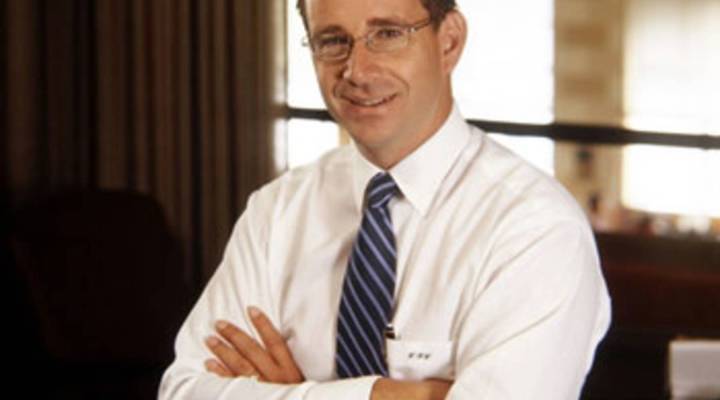
In banking, with age comes experience

TEXT OF STORY
Tess Vigeland: This week the Treasury Department finally started pumping cash directly to banks as part of the $700 billion Wall Street rescue package. The nine biggest banks in the country got a piece of the action. Some small regional banks also signed up, but others? Well, they have no intention of taking taxpayer money — don’t want it, don’t need it. Sounds kind of old fashioned, doesn’t it?
Pull open the heavy brass doors of Farmers & Merchants Bank in Long Beach, California, and you’re inside a building out of Central Casting. Tellers process checks and type notices under ornate chandeliers. The low hum of transactions bounces off the bank’s marble walls and cathedral ceilings.
CEO Henry Walker watches over it all from a second floor balcony. He’s the fourth generation of his family to run Farmers & Merchants.
Henry Walker: This building was built by my great-grandfather C.J. Walker in 1923 and he purchased the land and built the building. At the time it was the tallest building in Long Beach. The marble out here is Tennessee marble, then you’ve got Italian marble on the walls and of course the gold leaf. You have the traditional brass teller cages that were typical of the 20s era. And we’re quite proud of the building; we think it’s one of the most beautiful buildings in Los Angeles County for sure.
This sturdy, classic feel of Farmers & Merchants goes beyond the decor. Ken Walker, 82 years old, still heads the bank after 60 years of work; customers can walk right up to the glass window in front of him that says “Loans/”
Walker: He sits on the main floor, behind the roll-top desk that was occupied by his grandfather and I sit at the desk that was occupied by my grandfather.
I asked Henry Walker how the bank maintains its customers’ trust when people are talking about mattresses as a safer depository.
Walker: Our first responsibility is to maintain a safe and sound deposit environment for our customers and that is a philosophy that originated with my great-grandfather and has passed through my grandfather in the Depression to the current times that we’re in. And we accomplish that with ultra-conservative loans, very conservative bond portfolio and capital in excess of three times our regulatory requirements.
Vigeland: How do you define an ultra-conservative loan? What is that?
Walker: We typically do not go beyond 50 percent loan-to-value on real estate and where all the other banks were going 65, 70, 75, 80, we stayed at 50 percent. And then you deal with quality borrowers that you know because integrity and character are what come through in troubled times.
Vigeland: How do you know that?
Walker: You learn the integrity and character of your borrower by knowing who they are: by going to their place of business, by being around them, by having a deposit relationship that lasts for years and years. We see them at the charity functions, we might see them at the church, we might see them at the temple…
Vigeland: There are people who are actually flying into Long Beach because of your reputation for safety. They’re withdrawing from other banks.
Walker: We have had people from outside of California and in other parts of the market area that we don’t serve bringing their money into the bank. While we appreciate it, they could probably just take their money and buy U.S. treasuries with it and still be safe, but we’re happy to safeguard their money and perform that function for them.
Vigeland: I wonder if it will be a trend toward going back to the community bank?
Walker: I do anticipate that community banks typically will function well and maintain strong balance sheets. We have to maintain strong balance sheets because in the case of the ultra-large banks the government steps in and safeguards them, don’t they? The smaller banks, we need to take care of ourselves and we do.
Vigeland: What did consumers do wrong here, setting aside those who knowingly and willingly got into mortgages they knew they couldn’t afford? But for the average, say, banking customer, where is their responsibility in all of this?
Walker: The average banking customer does need to be responsible as to how they invest their money and where they put it. IndyMac was paying very high interest rates on their CDs. That should have been a clue because there’s always a risk for high return. But a lot of consumers did nothing wrong and they will be punished for the sins of others, won’t they?
Vigeland: Do you think that we will enter an era, perhaps a new era of conservative investing and banking on the part of consumers?
Walker: I hope the consumers pull back. I hope that the consumers manage their debt in a more conservative fashion and that will cause our economy to slow, but I think it’s something that we have to do as responsible consumers, as responsible parents and citizens. We have to manage our personal debt first and foremost responsibly.
Vigeland: Well, Henry Walker, CEO of Farmers & Merchants Bank here in Long Beach, thanks for inviting us in.
Walker: It’s been my pleasure. Thank you for coming.
There’s a lot happening in the world. Through it all, Marketplace is here for you.
You rely on Marketplace to break down the world’s events and tell you how it affects you in a fact-based, approachable way. We rely on your financial support to keep making that possible.
Your donation today powers the independent journalism that you rely on. For just $5/month, you can help sustain Marketplace so we can keep reporting on the things that matter to you.











